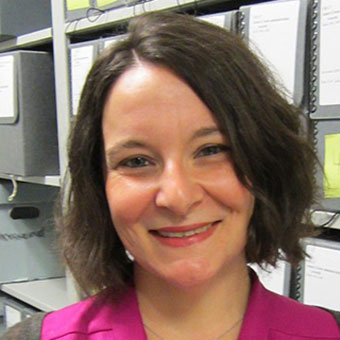Alexis Antracoli, PhD‘06, History
 Assistant University Librarian for Special Collections, Princeton University
Assistant University Librarian for Special Collections, Princeton University
Can you describe your career path and how it has led to your current work?
I completed my PhD in American History in August 2006 and began a tenure-track teaching job that same month. Two years into that position, it became clear that a traditional academic career path was not the best fit for me. I find that the work I do now is a better fit for my personality and natural talents. I took the time to explore other options and settled on archives and libraries. I had worked in both as an undergraduate, and enjoyed the work, but had followed another path. In 2009, I returned to school to get a Master of Science in Information degree at the University of Michigan while also working at the Bentley Historical Library. I then worked as both a project archivist at the Bentley and in a dual records management/archives position at Drexel University before getting a job at Princeton’s Mudd Library as Assistant University Archivist for Technical Services in 2015, a role I held until April 2019 when I became Interim Assistant University Librarian for Special Collections with broader responsibilities. I also still teach as an adjunct at the Rutgers School of Information and Communication, where I teach a course called Manuscripts and Archives.
What services and/or resources did you use while at Brandeis for your career search?
I used the Career Center and met with career advisors. I found that the network of alumni was helpful to me in my career change. I reached out to other Brandeis grads who had entered the library world and had conducted informational interviews.
What skills from your Brandeis degree have you found most valuable in your current work?
I think that the general skills of self-motivation and time management are necessary to complete a doctoral degree and help me daily to plan my work and accomplish goals. My teaching experience, of course, has allowed me to continue to teach in my new field on a part-time basis. I also find that my experience as a researcher in archives is very helpful when I have to think about how researchers describe our materials and might use them. Of course, archival researchers come from a wide variety of backgrounds, but having that experience as a patron informs my commitment to access and user-friendly description and discovery systems. That being said, there’s so much that I do now that I never imagined was part of library and archival work, and being a researcher doesn’t, in and of itself, qualify me for my work as an archivist or librarian.
What advice do you have for current students as they embark on their job search?
Use the alumni network and the Career Center. Ask a lot of questions about what a career/job is really like. Do internships to see if it’s really a good fit. Be willing to try and fail. One thing that was particularly helpful to me was getting resume and cover letter reviews. When I started applying for jobs in libraries and archives I had no idea how to create a job application for those kinds of roles, only having applied to academic jobs, and having career advisors with experience really helped me create application materials that got me interviews. Also, sign up for practice interviews. The non-academic job market can be really different in some ways, and getting to know the norms and expectations is essential for success. I got this both through good feedback on my interview skills, application materials, and informational interviewing with people currently in the field.






